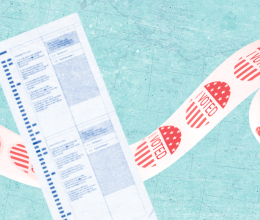COLUMBUS, Ohio — Today, the ACLU of Ohio responded to House Joint Resolution 4 and Senate Joint Resolution 6, resolutions introduced on May 17, 2022 that are now rapidly proceeding through the Statehouse. If approved by the General Assembly, this effort will result in voters deciding whether to amend the Ohio Constitution in the November 2022 election.
Both resolutions provide that only a United States citizen is permitted to vote in Ohio elections. The ACLU of Ohio maintains such provisions are entirely unneeded as existing Ohio law currently contains multiple provisions regarding who may legally vote in our state, including citizenship requirements.
The following statement can be attributed to Gary Daniels, Chief Lobbyist for the ACLU of Ohio:
"It is clear this latest effort has nothing to do with policy and everything to do with politics. Ohio law is explicit with regard to voter eligibility and citizenship, making HJR 4 and SJR 6 and the rush to put this matter on the ballot 100% unnecessary.
That said, the ACLU of Ohio is also deeply concerned about the timing of this particular effort while ‘Replacement Theory’ (the idea in certain right-wing circles that white Americans are being systemically and deliberately ‘replaced’ by non-whites) and similar ideas continue to result in threats and violence against others. Efforts such as these also promote the thoroughly discredited notion that elections in Ohio and other states are faulty, compromised, or even illegitimate, because of deliberate misinformation spread by partisan and ideological operatives. This, too, has resulted in threats and violence against others.
We believe HJR 4 and SJR 6 send an unmistakable signal to adherents of “Replacement Theory’ and “The Big Lie” there is merit to their claims and concerns. Beyond the fact these resolutions accomplish nothing of substance, they can only add fuel to the wave of fanatical xenophobia. For these reasons and more, we call on the General Assembly to reject these measures and concentrate their efforts on positive accomplishments to actually benefit Ohio and their constituents."
Here are the relevant Ohio Revised Code, Ohio Constitutional, and Federal law provisions requiring US citizenship to be eligible to vote, as well as Ohio Supreme Court holding opinions on Ohio’s home rule authority. Please note the language linked to the sources below are paraphrased.
- Ohio Constitution, Article V, Section 1 “Who may Vote” – Provides that “citizens of the United States” who are at least 18, reside in the relevant district, and have been registered for 30 days, may vote.
- ORC 3503.01(A) – Requires an elector to register in order to vote
- ORC 3503.07 – electors must be citizens of the US in order to qualify to register to vote
- ORC 3503.14 – the SOS shall provide a uniform voter registration form that meet the requirements of the National Voter Registration Act of 1993 (NVRA)
- NVRA – Section 5 requires a citizenship designation for in-person voter registration.
- NVRA - Section 9 requires a citizenship designation for mail-in voter registration
- ORC 3503.20(C) – Requires a citizenship designation for electors registering to vote using Ohio’s online voter registration platform
- Canton v. State (2002): OSC precedent for what defines a “general law” for the purpose of home rule analysis
- Village of Struthers v. Sokol (1923): OSC precedent on determining whether a municipal home rule authority is “in conflict” with a general law (as outlined in Canton)





